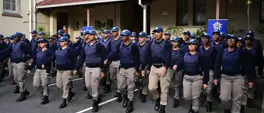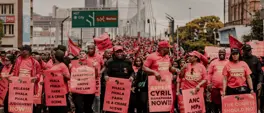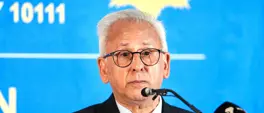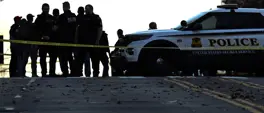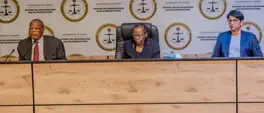Ramaphosa: SAPS inquiry established to affirm SA's commitment to the rule of law
Lindsay Dentlinger
14 July 2025 | 4:47President Cyril Ramaphosa made the announcement in an address to the nation on Sunday night, a week after KwaZulu-Natal Police Commissioner Nhlanhla Mkhwanazi made sweeping claims about infiltration, collusion, and political interference in the South African Police Service.

President Cyril Ramaphosa addressed the nation on 13 July 2025. Picture: @GovernmentZA/X
CAPE TOWN - President Cyril Ramaphosa said an inquiry to probe corruption within the police is being established against the backdrop of significant progress in rebuilding and strengthening the country’s law enforcement agencies and security services.
Ramaphosa made the announcement in an address to the nation on Sunday night, a week after KwaZulu-Natal Police Commissioner Nhlanhla Mkhwanazi made sweeping claims about infiltration, collusion, and political interference in the South African Police Service (SAPS).
ALSO READ:
- Ramaphosa puts Mchunu on leave of absence, inquiry to probe Mkhwanazi's allegations
- IN FULL: Ramaphosa's address regarding Mkhwanazi's allegations
While several political parties are unimpressed by the decision because of a lack of consequences for those implicated by inquiries as well as the time and money involved, Ramaphosa said it’s essential to maintain the momentum of the work done by several corruption-busting agencies, including the Special Investigating Unit (SIU) and the Asset Forfeiture Unit (AFU).
“In establishing this commission of inquiry, we are affirming our commitment to the rule of law, to transparency and accountability, and to building a South Africa in which all people are safe and secure.”
Ramaphosa has suspended Minister of Police Senzo Mchunu in the interim to facilitate the commission’s work.
Wits law professor Firoz Cachalia will act in the position as from August, while Ramaphosa is still to announce an interim replacement who will act until Cachalia can take up the job as one of two outsiders the president is constitutionally allowed to appoint to his Cabinet.
“Once established, the commission shall consider prima facie evidence relating to the involvement of individuals currently employed within law enforcement or intelligence agencies.
"Where appropriate, the commission must make recommendations on the employment status of such officials, including whether they should be suspended pending the outcome of further investigations.”
Get the whole picture 💡
Take a look at the topic timeline for all related articles.





